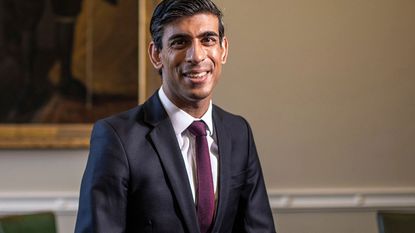With the £1bn “Future Fund”, maybe the state can pick winners after all
Through the Future Fund, the UK government now has lots of stakes in small, start-up, high-growth companies. Time will tell whether that was wise, says Matthew Lynn.


Slightly over a year into his time as chancellor, some of us are starting to wonder if adding up is not exactly Rishi Sunak’s strong point. The furlough scheme has cost close to £50bn already – far more than the initial estimates – and it is still running. Eat Out To Help Out was meant to cost £500m, but came in at £849m. We can now add the Future Fund to the list. It was launched at the height of the first lockdown, when deal-making was frozen, to prevent a generation of start-ups being wiped out because they couldn’t stage a fresh funding round. At the time, the government put aside £500m in funding. The scheme closed on 31 January and the final amount spent has just been announced. It was £1.1bn. But heck, what’s a 100% rounding error at the Treasury these days?
The government places its bets
It is the first time the UK has tried anything like this since the launch of what became 3i in 1945 when the Industrial and Commercial Finance Corporation was created to invest in small and medium-sized businesses struggling for cash in the wake of World War II. For the last 30 years, we have stuck to the mantra that the government can’t pick winners, and shouldn’t bother trying. Indeed, for most of that time the government has mostly tried to get rid of any stakes it owned in companies, and certainly not tried to add to them (with the exception of the banks in the 2008 crash, but it sold those shares as fast as it could). The Future Fund has changed that, and may well be extended: at the time of writing, the chancellor was expected to launch a “Breakthrough” fund in the Budget that will invest in fast-growing technology companies.
Can it work? The fund has certainly made some really interesting bets. In total, the money was invested in 1,140 companies. The bulk – almost 70% of the total – went to companies in London and the south east, the UK’s start-up hub; the rest was spread around the country. For example, £30m went to new businesses in Yorkshire and the Humber. Some of the companies invested in include Habito, a digital mortgage broker, and TuningBill, which offers banking services for cross-border businesses. Those are precisely the kind of potentially fast-growing, tech-based businesses the UK is trying to encourage. Anecdotally, lots of companies took the cash to bulk up their balance sheet and skip the next funding round. The offer from the chancellor was a generous one, and the terms more than fair, so any start-up that thought it might need cash over the next couple of years had an incentive to take it now and park the money on its balance sheet. The result? The UK government now has lots of stakes in small, start-up, high-growth companies. And the companies have some cheap capital from a supportive long-term shareholder which won’t be pressuring them to list their shares or do their best to sell themselves to Google.
Subscribe to MoneyWeek
Subscribe to MoneyWeek today and get your first six magazine issues absolutely FREE

Sign up to Money Morning
Don't miss the latest investment and personal finances news, market analysis, plus money-saving tips with our free twice-daily newsletter
Don't miss the latest investment and personal finances news, market analysis, plus money-saving tips with our free twice-daily newsletter
A gamble worth taking
We will find out what happens to them all over the next three or four years. There will inevitably be a few collapses – that is part of the venture-capital model. And there will probably be a few who spend their proceeds all on the traditional entertainments of entrepreneurs who are suddenly flush with easy cash. There will be some embarrassing headlines for the Treasury as a few spectacularly fail, taking a ton of taxpayers’ money with them. Yet there should also be a few that turn into stunning successes and make a lot of money for the Treasury.
We will see. But if it works, it is just possible that the UK will have stumbled across a funding model for creating more fast-growing businesses. And even if it doesn’t, we will have learned something valuable about what the government can and can’t do. For three decades, the UK has been firmly of the view that the state should get out of the way and let the markets decide which companies get backing, and which don’t. Largely by accident, we are now trying something different. Backing early-stages companies is a hard trick to pull off, but if it works, it could end up creating a lot of wealth for the country.
Matthew Lynn is a columnist for Bloomberg, and writes weekly commentary syndicated in papers such as the Daily Telegraph, Die Welt, the Sydney Morning Herald, the South China Morning Post and the Miami Herald. He is also an associate editor of Spectator Business, and a regular contributor to The Spectator. Before that, he worked for the business section of the Sunday Times for ten years.
He has written books on finance and financial topics, including Bust: Greece, The Euro and The Sovereign Debt Crisis and The Long Depression: The Slump of 2008 to 2031. Matthew is also the author of the Death Force series of military thrillers and the founder of Lume Books, an independent publisher.
-
 Stop inheritance tax perk on pensions, says IFS
Stop inheritance tax perk on pensions, says IFSThe government could raise billions of pounds in revenue by closing inheritance tax loopholes, such as on pensions and AIM shares. Is your pension at risk?
By Ruth Emery Published
-
 Revealed: Best buy-to-let property hotspots in the UK
Revealed: Best buy-to-let property hotspots in the UKLooking for the best buy-to-let property locations in the UK? We reveal the top 10 postcodes with the strongest rental returns
By Oojal Dhanjal Published
-
 Should your business invest in a VoIP phone service?
Should your business invest in a VoIP phone service?Here's what you need to know about VOIP (voice over IP) services before landlines go digital in 2025.
By David Prosser Published
-
 The end of China’s boom
The end of China’s boomLike the US, China too got fat on fake money. Now, China's doom is not far away.
By Bill Bonner Published
-
 What is the future of Royal Mail in the UK?
What is the future of Royal Mail in the UK?With fewer of us sending letters and parcels, the Royal Mail is finding dealing with the nation’s post is an increasingly unprofitable and costly business.
By Simon Wilson Published
-
 What's the secret of Manolo Blahnik's success?
What's the secret of Manolo Blahnik's success?Fashion maestro Manolo Blahnik shows little sign of slowing down at 81, and his company notched up a record financial year in 2022. What is the secret of his success?
By Jane Lewis Published
-
 Michelle Mone's "tough year of pain"
Michelle Mone's "tough year of pain"Michelle Mone liked to portray herself as a working-class heroine who worked her way to the top through grit and determination. But her pedestal is built on sand.
By Jane Lewis Published
-
 Trevor Milton, the Elon Musk wannabe, is jailed for fraud
Trevor Milton, the Elon Musk wannabe, is jailed for fraudThe former CEO of Nikola, Trevor Milton, has been found guilty of lying about the development of the company's electric trucks.
By Jane Lewis Published
-
 Directors should think twice before waiving limited liability
Directors should think twice before waiving limited liabilityShould small-business directors ever provide a personal guarantee in return for bank finance?
By David Prosser Published
-
 Why Russia's economy is doing better than predicted
Why Russia's economy is doing better than predictedSanctions were supposed to strangle Russia’s economy, but it seems to be thriving. What’s going on?
By Simon Wilson Published